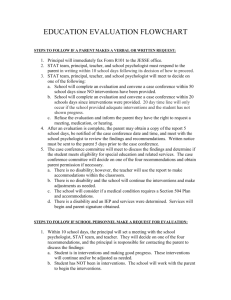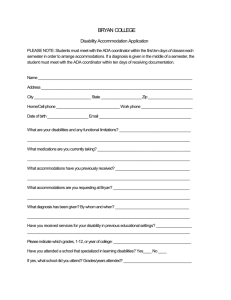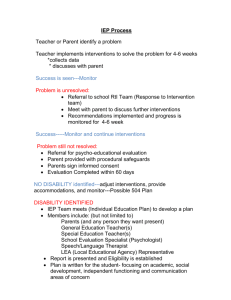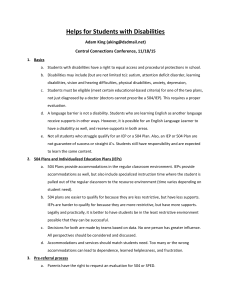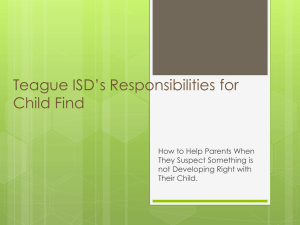Psychologist`s Post - Montgomery County Public Schools
advertisement
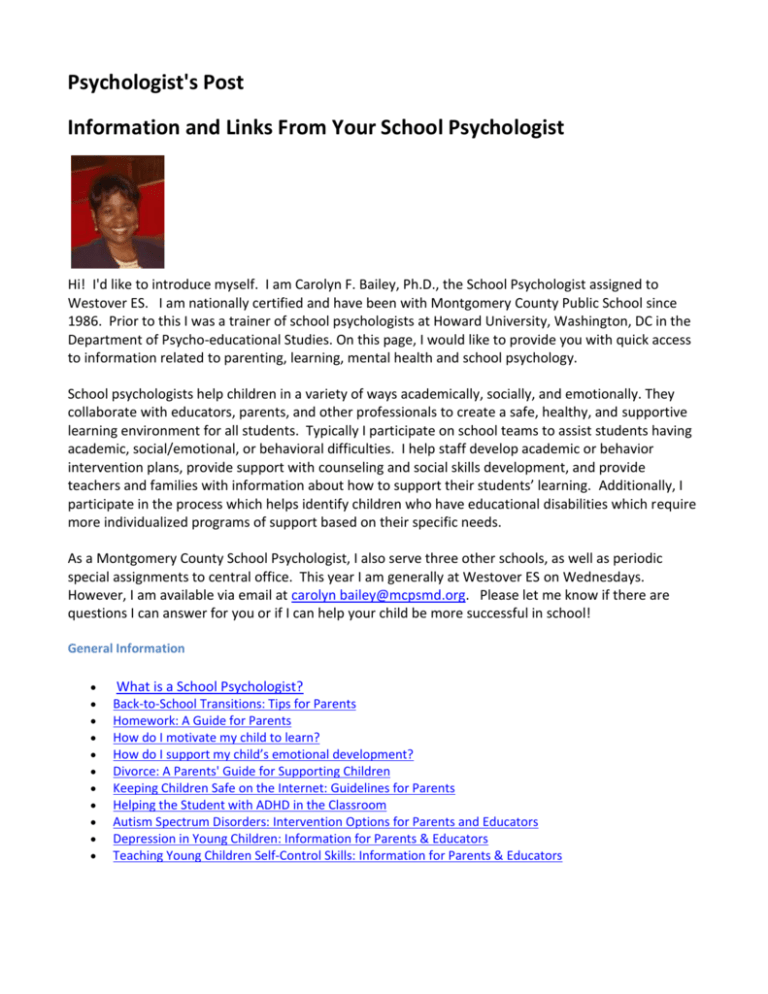
Psychologist's Post Information and Links From Your School Psychologist Hi! I'd like to introduce myself. I am Carolyn F. Bailey, Ph.D., the School Psychologist assigned to Westover ES. I am nationally certified and have been with Montgomery County Public School since 1986. Prior to this I was a trainer of school psychologists at Howard University, Washington, DC in the Department of Psycho-educational Studies. On this page, I would like to provide you with quick access to information related to parenting, learning, mental health and school psychology. School psychologists help children in a variety of ways academically, socially, and emotionally. They collaborate with educators, parents, and other professionals to create a safe, healthy, and supportive learning environment for all students. Typically I participate on school teams to assist students having academic, social/emotional, or behavioral difficulties. I help staff develop academic or behavior intervention plans, provide support with counseling and social skills development, and provide teachers and families with information about how to support their students’ learning. Additionally, I participate in the process which helps identify children who have educational disabilities which require more individualized programs of support based on their specific needs. As a Montgomery County School Psychologist, I also serve three other schools, as well as periodic special assignments to central office. This year I am generally at Westover ES on Wednesdays. However, I am available via email at carolyn bailey@mcpsmd.org. Please let me know if there are questions I can answer for you or if I can help your child be more successful in school! General Information What is a School Psychologist? Back-to-School Transitions: Tips for Parents Homework: A Guide for Parents How do I motivate my child to learn? How do I support my child’s emotional development? Divorce: A Parents' Guide for Supporting Children Keeping Children Safe on the Internet: Guidelines for Parents Helping the Student with ADHD in the Classroom Autism Spectrum Disorders: Intervention Options for Parents and Educators Depression in Young Children: Information for Parents & Educators Teaching Young Children Self-Control Skills: Information for Parents & Educators Other Resources National Association of School Psychologists The National Institute of Mental Health Maryland State Department of Education Montgomery County Child & Adolescent Mental Health Maryland Coalition of Families for Children’s Mental Health What is an Intervention? Your child’s teacher gathers a great deal of data on your child’s academic levels and progress towards grade level expectations. Sometimes this is done through unit or theme assessments which target information that was specifically taught, while other times it is done periodically throughout the year (e.g., in reading) to measure incremental progress. When a student is not making progress on a set of skills, his/her teacher may choose to recommend the student for an intervention to target the skills on which the student is struggling. These general education interventions are developed for children, based on the data that has been taken; the data helps the teacher and other school personnel know the child’s area of need so that the most appropriate evidence-based intervention can be put in place to help remediate the problem. Interventions are generally given for six to eight weeks. Along the way and at the end of the intervention period, data is taken to measure progress. Some students make great progress and exit the intervention group. Other students, who perhaps have made progress but not as much as his/her teacher would have liked, may stay in for some additional practice. A few students may continue to struggle to make progress. For these few students, separate, more individualized interventions may be developed to see if their rate of progress can be improved. When a student has not responded well to such specific, targeted interventions, the team may wish to discuss whether or not evaluations are needed to help determine the presence of a disability. What is an FBA/BIP? Children behave in certain ways based on what they have been taught by their parents, grandparents, and teachers. What is expected of them changes, based on where they are and, for the most part, children learn to differentiate the ‘rules’ from one situation to another. When children struggle, however, to behave appropriately in school and this behavior disrupts their learning and the learning of others, school staff may recommend conducting a Functional Behavioral Assessment, or FBA. An FBA is a data-driven process which looks at when a behavior occurs, what the behavior looks like, and what happens in response to the behavior. Sometimes staff will keep track of how often something happens, in addition to when it happens. All of this data is used to try to determine why a student may be engaging in the problem behavior. Common reasons why children engage in negative behavior include to seek attention from others, to avoid tasks or situations, to express frustration or anger, and to seek power or control. Once it is clear from data collected by school staff when and why a problem behavior is occurring, they work on developing an intervention plan to help decrease the problem behavior. Behavior Intervention Plans, or BIPs, focus on strategies that can be used in the classroom, teaching replacement behaviors or skills so that the student has an alternative to engaging in the negative behavior, and reward systems to help motivate the student to change his or her behavior. As with academic interventions, data is taken on BIPs to measure a student’s progress on the intervention. BIPs are modified to fit the changing needs of the student; they are discontinued when a student no longer demonstrates a need for the intervention. What is a 504 Plan? Section 504, of the Rehabilitation Act of 1973, is a federal law that protects the civil rights of persons with disabilities. The Act prohibits any organization that receives federal funds, such as the public school system, from discriminating against otherwise qualified individuals because of a disability. A student with a disability should be considered for eligibility and accommodations under Section 504 if he/she has a physical or mental impairment which substantially limits one or more major life activities. In the school system, ‘impairments’ or disabilities which often receive accommodations under Section 504 include (but are not limited to) Attention Deficit Hyperactivity Disorder (ADHD), severe allergies, cerebral palsy, diabetes, and epilepsy. The impairment must “substantially limit” or restrict a student’s ability to perform a “major life activity” involved in school. These “major life activities” include learning, caring for oneself, performing manual tasks, walking, seeing, hearing, speaking, breathing, working, standing, lifting, bending, reading, concentrating, thinking, and communicating. A diagnosis of a disability does not automatically qualify a student for accommodations under Section 504. The student must demonstrate need for accommodations, based on the comparison of his/her performance to that of the average student in the general population. Teachers or parents who feel a student may meet the criteria for Section 504 eligibility may request an Educational Management Team (EMT) meeting to discuss their concerns. The EMT meeting may include the principal, school counselor, school psychologist, pupil personnel worker, school nurse, and any other relevant school personnel, as well as the parent and teacher. The EMT will review various sources of information (e.g., report cards, observations, medical reports, and other data necessary to determine whether a student is eligible for accommodations under Section 504). As mentioned previously, a student must demonstrate need for accommodations, based on the comparison of his/her performance to that of the average student in the general population. Section 504 accommodations are general education accommodations designed to level the playing field for persons with disabilities. Section 504 is not special education. If, at any time, a review of a student’s data suggests the presence of a disability covered under the Individuals with Disabilities Education Act (IDEA 2004) the team will refer the student to an Individualized Education Program (IEP) Team. Parents will be asked to attend a screening meeting with the IEP Team. What is special education? Special education is governed by federal law under the Individuals with Disabilities Education Improvement Act of 2004 (IDEA 2004) Public Law [108-446]. It is defined as "specially designed instruction, at no cost to parents, to meet the unique needs of a child with a disability." Special education provides additional services, supports and programs, for students with special needs. Sometimes these are provided in specialized placements or environments; depending on the needs of the child. The vast majority of students in Special Education receive services in their home school and with nondisabled peers. The range of special education support will vary based on need. There are many guidelines governing Special Education and the MCPS website is a good resource for parents. What is a disability? The term a “child with a disability” refers to a child, who has been identified with one of the state- and federally-recognized disabilities, who needs special education services. In general, this means that, as a result of the disability, the child is having a great deal of difficulty in the regular education program and even with general education interventions and supports requires something more specific for that child to learn. The disability categories are: Intellectual Disability Hearing Impairments (including deafness) Speech and/or Language Impairments Visual Impairments (including blindness), Emotional Disability Orthopedic Impairments Autism Deaf/blindness Traumatic Brain Injury Other Health Impairments Specific Learning Disabilities Developmental Delay Multiple Disabilities What do I do if I suspect my child has a disability? You should contact your child’s teacher or a school administrator. There are a number of school-based programs designed to assist children that are struggling in school. Educators are trained to work with children with a wide range of learning needs. There are also school-based teams of professionals that meet to help design, implement and monitor specific interventions to assist struggling students. Most children respond well to these general education interventions. Parents are important members of our teams and we want you to be a part of your child’s learning and progress. If your child is still not making good progress, the team may decide to seek evaluations to help determine the presence of a disability. These evaluations can only be conducted with the informed consent of the parents and are provided at no cost to the family. Once evaluations have been completed, the school team discusses the results with you, the parent, and determines whether or not your child meets the eligibility criteria for one of the federally-defined educational disabilities. If he/she does, then goals are developed and services are recommended to meet your child’s needs in order to help remediate the problems identified through the evaluations. There are many guidelines governing Special Education and the MCPS website is a good resource for parents. Your school team, including the school psychologist, is there to help explain the process and ensure that your child can learn and succeed!



